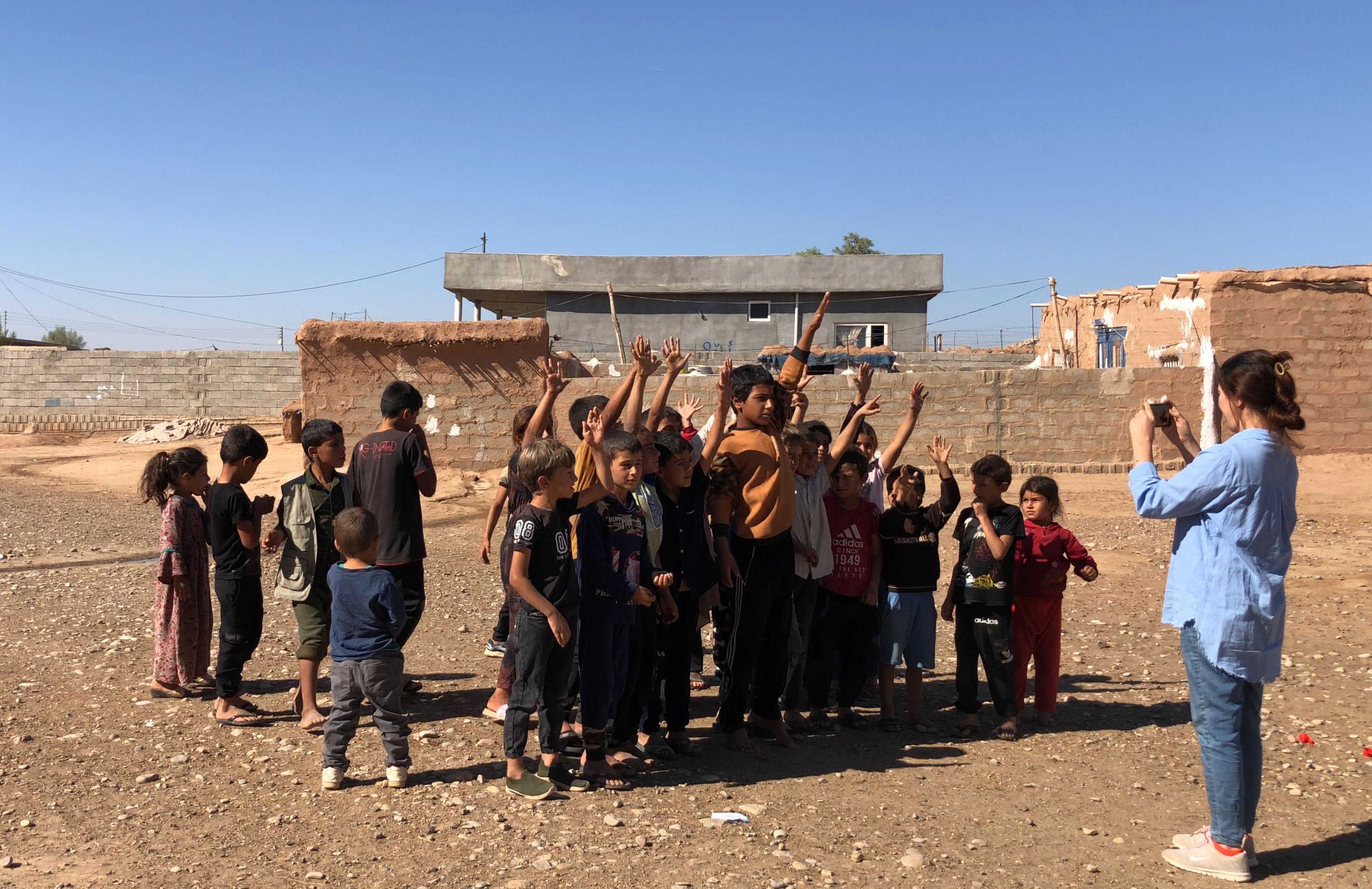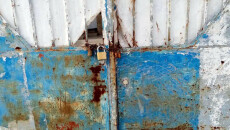None of Salima Hamid's 13 children completed sixth grade, as the boys quickly turned to hard labor, and her daughters were married off at an early age.
Hamid, a resident of Sayed Hussein village in the Kifri district, justified her children’s dropping out of school because there was no school in her village and the difficulty of bearing the costs of studying in another area if they were transferred to the city.
There has been a school in this village for several years. In the beginning, grades one to six were open, and only a year ago, it was extended up to grade nine.
“All my children studied until the grade six because the school was until the sixth grade and we had to transfer them to the town schools to complete their studies, which was a burden for us.”
Hamid, 55, told (KirkukNow), is a mother of nine girls and four boys whose only source of livelihood is livestock raising.
37 families live in the village of Sayed Hussein. There are dozens of children in the village, and all passed primary school. They are all busy raising livestock and agriculture. According to Kirkuk Now’s observations, all the boys and girls of the village were married off at an early age.
Hero Ismail (17) is a tall girl with blue eyes and blond hair. It seems from the way she speaks that she is a smart girl. Hero did not hide her strong desire to complete her education she was forced to quit years ago. She still dreams of becoming an English language teacher.
The village's residents are Arab, but they are not fluent in the Arabic language. Their education, the uniform they wear, and the language they speak are Kurdish. Most of them are blond, have blue eyes, and have white or tan skin.
I told my mother to help me return to school after studying in the village up to the ninth grade, but she refused
“I told my mother to help me return to school after studying in the village up to the ninth grade, but she refused and said you are now as old as the teachers. Even if you pass grade nine, you must (later) quit school.”
Years ago, she stayed with her grandparents in the Kifri district so that she could attend school, but they left Kifri, so she hopelessly returned to her village.
Hero has three sisters and two brothers, none of whom got a degree. Hero is illiterate, and her sisters were married when they were 15 to 19 years old.
Even if you pass grade nine, you must (later) quit school
Kifri, home to over 50,000 people, is one of the districts located within the disputed territories, part of Diyala province run by the Iraqi government, while administratively is one of the districts of the Garmian local administration.
Garmian administration which includes several districts and sub-districts between Sulaymaniyah and Diyala province is part of Sulaymaniyah Northern Province, one of the provinces of the Kurdistan Region of Iraq KRI under the Kurdistan Regional Government KRG.

(Kirkuk Now) was unable to obtain statistics on the number of children who dropped out of school in the village of Sayyid Hussein and other areas in Kifri through administrative officials or the district education department, but in total, more than 20,000 students, both male and female, dropped out of school in Sulaymaniyah Northern Governorate, which includes the Kifri District. of the Garmian Administration during the academic year (2022-2023), according to statistics from the General Directorate of Education.
Ismail Samin, director of education in the Kifri district, told KirkukNow, “We obtained statistics on the number of children who dropped out of school and were illiterate. We returned a large number of them to study,” as part of a campaign to encourage the return to study. It was a field program implemented by several committees in all areas of Kifri, but he said, “We cannot reveal statistics because that is one of the conditions of the program.”
The project, called (Return to Study), is supervised by UNICEF, in coordination with the KRG Ministry of Education and some non-governmental organizations NGOs, to return children who dropped out for various reasons to school. The project was launched in 2020 and is still ongoing.
Hamid's sons and daughters have not lost their passion for studying, but their family does not want them to return to school. The boys raise livestock and the girls were married off when they were 14 or 15 years old.
My daughters are housewives and raise livestock as well
"My daughters are housewives and raise livestock as well. They still ask me to tell their father so that he will allow them to return to school, but we refuse that because they have reached puberty, and studying will do them no good. We cannot send them to the city to study, and we also married them off at the age of 14 and 15." Hamid said.
Under the laws in force in Iraq, marriage is permitted for anyone who has reached the age of fifteen under several conditions.
In general, the educational process in the Iraqi Kurdistan Region is not running smoothly, as attendance has been suspended in most schools in Sulaymaniyah Governorate after teachers went on strike at the beginning of the school year due to the non-payment of their salaries, as the salaries for the last quarter of 2023 were skipped, and up today, and teachers have not been paid for January. Some schools opened their doors at the end of January and the beginning of February.
Taha Rashid, head of the child support office in the Garmian branch of the Kurdistan Save the Children Organization (Mindalparez), told (KirkukNow), “For children who dropped out of school and return to school, we cover their expenses so that they can complete their education and guarantee their future.”
Within the framework of the project, Save the Children provided financial assistance and care to 121 boys and girls inside Kifri and villages affiliated with the district, providing financial assistance every two months to every needy family to complete their education.
Rashid says that the largest number of children who have dropped out of school live in villages, and he believes that the government must work in cooperation with NGOs to return them to school.
Iraq’s education infrastructure is in ruins in many parts of the country; one in every two schools is damaged and needs rehabilitation, says a report by the United Nations Children's Fund UNICEF about education in Iraq.
Many schools operate in multiple shifts due to inadequate buildings and staff in an attempt to accommodate as many students as possible, squeezing the little learning time that children have.
According to the educational laws and instructions in the IKR, studying from the first to the ninth grades is compulsory, and the Universal Agreement on the Rights of the Child stipulates that every child has the right to education.
The director of Kifri Education says that the problem of children leaving school exists in most villages. “If the children of these villages want to come to the city and complete their preparatory studies, we will open boarding sections for them. If the children of Sayed Hussein village want to join the schools of the district center, they can rent a bus and I will provide them with the necessary facilities.”
The Kifri Education Department supervises 90 schools that were established in the villages. Classes were suspended until a few weeks ago due to the teachers’ strike since the start of the academic year (2023-2024) in protest against the non-payment of their salaries.
Last year alone, 35,000 children dropped out of school in the IKR, 12,000 of whom were returned to school, including internally displaced and refugee children, within the framework of the return to school project, according to UNICEF statistics, in addition to the fact that more than three million Iraqi children were not enrolled in school.
However, according to the statistics of the KRG Ministry of Education, 6,579 dropped students returned to school for the academic year (2022-2023) within the framework of the return to study project, while the number of students returned in (2021-2022) was more than 4,600 students.
In the academic year (2020-2021), their number reached 8,000 students.
Hamid, an illiterate woman who has been preoccupied with the responsibilities of caring for her family since an early age, says that her children blame her for dropping out of school and not achieving their dreams to escape the hardships of life in the village.
She appeals to the government not to spare any effort to ensure a bright future for the children of Sayed Hussein village and other areas is not lost.
“I am also sad because they did not complete their education to obtain a certificate that qualifies them to get a job and a salary.”





